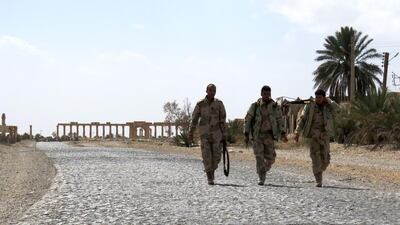For several years, when asked for my views on the region’s short-term future, I’ve said that I cannot see any real reasons for optimism. I’ve only been able to see an increasingly darkening picture – more bloodshed, more deaths, more displacement of hundreds of thousands, nay millions, of people affected by the varied, but intertwined, conflicts that have torn, and continue to tear, the region apart.
I don’t feel that my pessimism was ill-founded. In September 2013, looking back on what had happened since the beginning of the sadly misnamed Arab Spring, I wrote: “What, I wonder, would Mohammed Bouazizi (the street trader whose self-immolation sparked off the first protests in Tunisia) make of the Arab Spring today? It has brought little in the way of democracy or dignity. Many tens of thousands have died; many millions have lost their homes and their livelihoods. And for what?”
Many more are dead now, many more displaced while the death and destruction has spread yet further. The evil cult of ISIL has emerged and Libya is a failed state. Assad, responsible for so much slaughter, survives in Syria. Europe is in crisis as a result of the arrival of millions of refugees and economic migrants, jihadi terrorists among them, many of them, as we saw last week in Brussels, being European Muslims who first went to join ISIL, then returned to cause havoc at home.
Initially confined to the Middle East, the impact of the conflicts has now spread to western Europe, where further horrors like those of Brussels and Paris are, surely, only a matter of time.
Closer to home, Turkey is in deep “crisis”. Having, at best, closed its eyes to the threat posed by ISIL – and many claim that its engagement with the terrorist group has gone far beyond that – its government has now resumed open conflict with the Kurdistan Workers Party (PKK), dashing hopes that tentative negotiations towards a resolution of its long-running Kurdish insurgency would eventually yield fruit. Here too, countless thousands of people are being displaced.
The recent agreement between the European Union and Turkey to allow Turks visa-free access to the Schengen states provided that Turkey halts the flow of refugees and migrants into Greece may also be cause for concern. If the agreement is implemented effectively, which I doubt, is the next wave of migration to be that of Turkish Kurds fleeing to Europe?
And yet, are there now some slight glimmers of hope for the future? Perhaps, just perhaps.
In Yemen, hard-hit by the conflict between the Saudi-led coalition and the Houthi forces, which are supported by Iran, there is now hope that next month’s talks may lead to a winding-down of the fighting.
Recent Iranian statements saying that they seek to repair relations with Saudi Arabia may indicate that they are prepared to reduce, if not to end, their troublesome engagement with the affairs of the peninsula. That would allow the threat in Yemen posed by Al Qaeda’s local franchise and ISIL to be tackled more effectively. In Syria, the ceasefire between the forces of Bashar Al Assad, with his Russian, Iranian and Hizbollah allies, and most of the opposition may not be wholly effective, but the level of violence appears to have been reduced in many areas.
As for ISIL, its recent expulsion from Syria’s Palmyra and its setbacks in Iraq suggest that the territorial extent of its fraudulent “caliphate” is declining, even if there is much fighting yet to be done and its far-flung supporters and sympathisers still have the ability to cause havoc in Europe and beyond.
There is a long way to go before the conflicts in the region come to an end. There will be more bloodshed, more loss of life, more devastation.I still believe that there are dark days ahead, but perhaps it’s now possible, for the first time in years, to identify a few fragile hopes for a better future.
Peter Hellyer is a consultant specialising in the UAE’s history and culture


